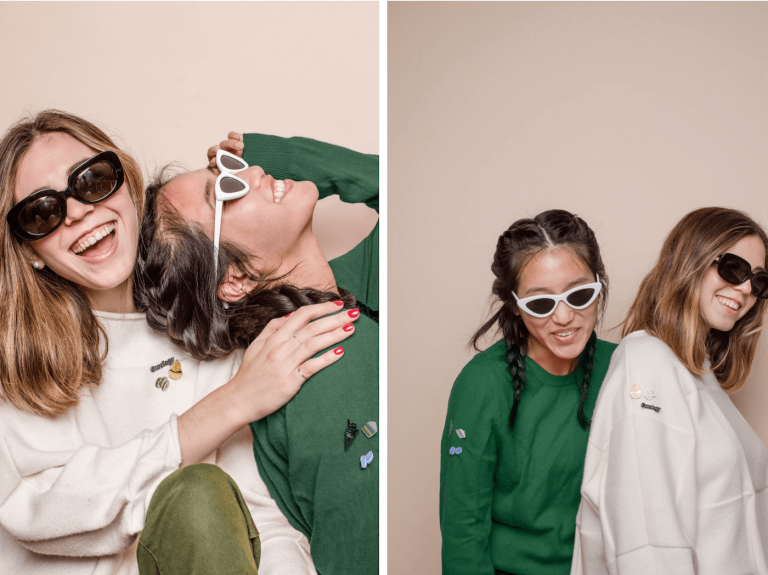How it works:
Share your skin goals and snap selfies
Your dermatology provider prescribes your formula
Apply nightly for happy, healthy skin
How it works:
How it works:
Share your skin goals and snap selfies
Your dermatology provider prescribes your formula
Apply nightly for happy, healthy skin
How it works:
What tanning beds actually do to your skin
Sorry, Charlie — tanning isn’t safe, even at the salon.



The feeling of warm sunlight is addictive — literally. So even though I’m in the running for palest goth in Florida, I totally understand the appeal of climbing into a tanning bed. Unfortunately, the idea that indoor tanning is safer than outdoor tanning is a complete myth, so if you love to hit the tanning salon, you aren’t doing your skin any favors. That’s why I’m here to illuminate tanning bed facts.

Facts about tanning beds
FALSE: tanning is safe in moderation
Tanning beds aren’t safer in moderation. Here’s the kicker — unless it comes in a bottle, a tan is always a sign of skin damage. That’s because any kind of laying out (whether inside or outside!) is a way of intentionally exposing yourself to too much sun. So even if you’re only occasionally hitting the tanning salon, you’re doing more harm than good.
Also, there’s often a delay between sun exposure and the appearance of sun damage on your skin. So trust me — while you might feel like a bronzed demigod now, it will likely cost you later.
FALSE: tanning beds are safer than outdoor tanning
Tanning beds aren’t safe. Whether the light is coming from the sun or from a tanning bed, they both have UV rays. I might even argue that tanning beds are less safe — for one, tanning salons can tend to spread a lot of misinformation — like that tanning has health benefits such as weight loss.
According to the American Academy of Dermatology, one indoor tanning session can significantly increase your risk for certain types of skin cancer. And while both indoor and outdoor tanning have similar risks, it’s worth noting that the FDA is pushing to ban tanning beds for those under the age of 18.
FALSE: tanning beds have skin benefits
Tanning bed benefits are a myth. It’s a myth that tanning makes dark spots and other forms of hyperpigmentation less noticeable — the spots get darker as your skin gets darker, so a tan won’t actually even out your skin tone. Also, if you wanted to hit a tanning salon to boost your vitamin D, you should save your money. While it’s true that pure, natural sunshine helps our bodies produce vitamin D, the same can’t be said of tanning beds — womp, womp!
The truth about sun protection
Protecting your skin from sun damage is one of the most important things you can do for your overall skin health. It’s important to not only skip the tanning salon but to take measures against the sun’s UV rays. Some things you can do:
Wear sunscreen. Find a chemical or mineral sunscreen with at least SPF 30 and re-apply it throughout the day — about every two hours if you’re outside. In case you need a sunscreen product recommendation, designed by dermatologists, the sunscreen by Curology is a no-clog, grease-free lotion that absorbs quickly and gives skin a fresh finish.
Cover up with clothing. Long-sleeved shirts and long pants and skirts can provide protection from UV rays. If you can’t wear clothing with full coverage, a beach coverup or t-shirt can also offer some protection. Items made from tightly woven fabric (like canvas, denim, or twill) offer more protection than loosely woven fabrics.
Wear a hat. Wide brimmed hats can protect your face, ears, and the back of your neck. If possible, try to avoid straw hats with holes that let sunlight through and opt for tightly woven fabrics that offer more protection from UV rays.
Don’t forget your shades. Sunglasses protect your eyes from UV rays and reduce the risk of cataracts. They also protect the tender skin around your eyes from sun exposure. Sunglasses that block both UVA and UVB rays offer the best protection.
Stay in the shade. You can reduce your risk of sun damage and skin cancer by staying in the shade under an umbrella, tree, or other shelter.
If you want to shoot for the sun-kissed look, you still have options. I’ve written about self-tanners here on the blog before. Body highlighters are another option, and so is other makeup, like blush and bronzer.

And if you’re struggling with signs of sun damage, we’re here to help—treating acne and anti-aging concerns is kind of our thing. Sign up for a free* trial of Curology to take a quick skin quiz and snap a few selfies, and one of our licensed medical providers will evaluate your skin.
Get your personalized skincare routine with Curology
Get your personalized skincare routine with Curology


If Curology is right for you, we’ll send you a 30-day supply of your Custom Formula with a mix of active ingredients chosen for your unique skin concerns, plus any of our recommended products (like the sunscreen), for free—just pay $5.45 (plus tax) to cover shipping and handling. Subject to consultation. Subscription is required.

Stephanie Papanikolas

Nicole Hangsterfer, PA-C
Related Articles
The science behind real glowing skin: how to shine without shimmer Ask an expert: What are the best skincare ingredients?Keep an eye out for these potential acne-causing ingredients Skin purging vs. breaking outIs my skin purging?Popular Articles
Ask Curology: Is my cold breaking me out?Slugging: The dermatologist-approved skincare hack going viral on TikTokTretinoin vs retinol: What’s the difference?How to create a self-care routine that actually sticksYour 2023 skincare horoscopeTry prescription skincare
Get routine essentials


Good skin days ahead
Good skin days ahead
- Breakouts
- Redness
- Fine lines
- Dark spots
- Hair thinning
$29.95/month